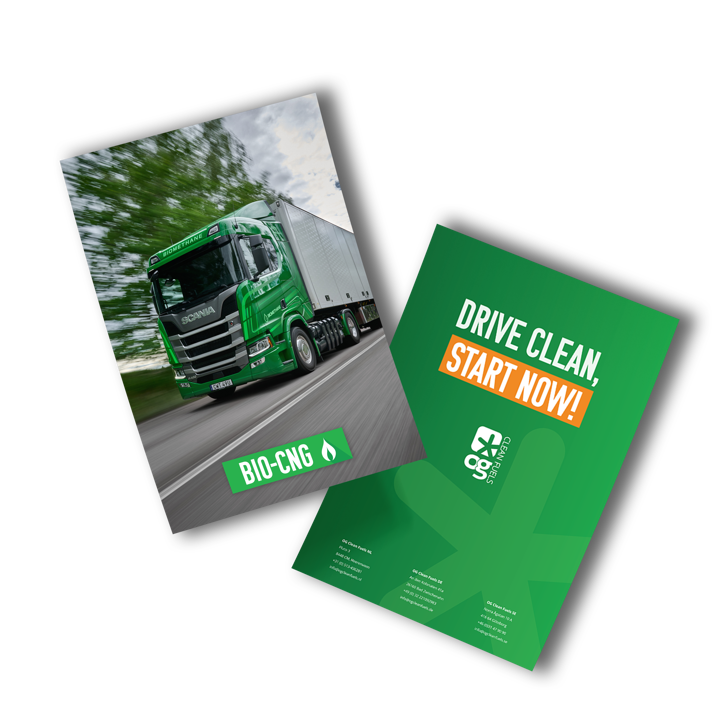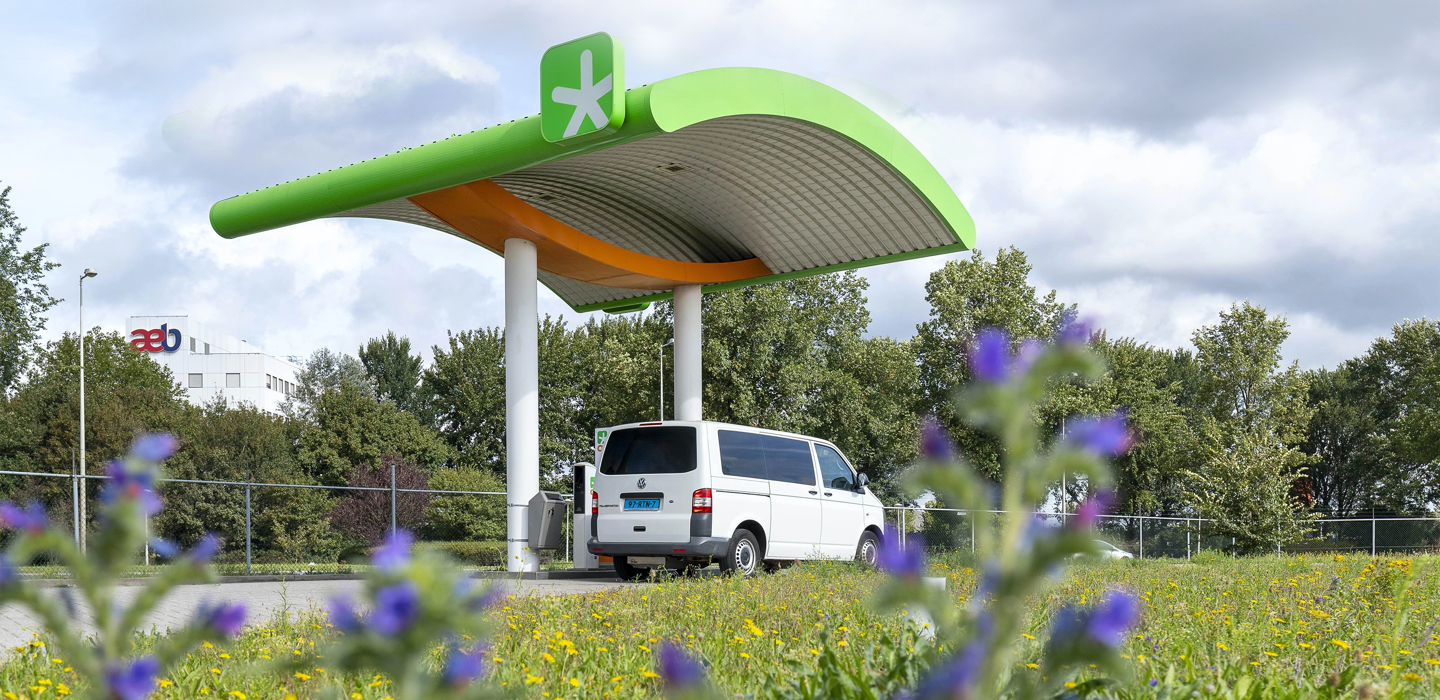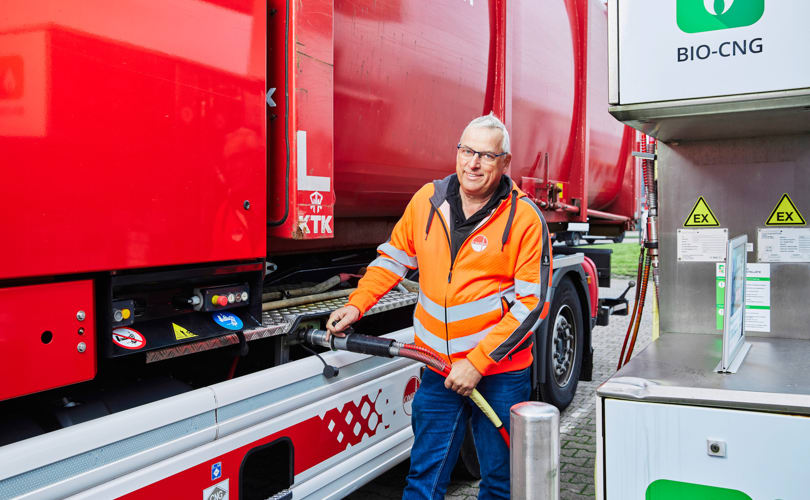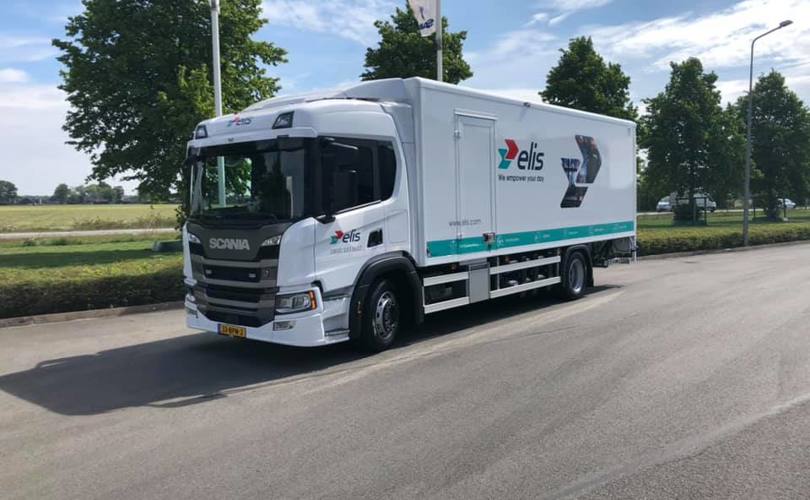Bio-CNG

Range: 500 - 1.000 km
More than 90% CO₂ reduction
Over 250 OG fuel stations in Europe
- Our clean fuels
- Bio-CNG
For entrepreneurs ready to switch to affordable sustainability, immediately
For entrepreneurs looking to adopt sustainable transport without making a significant investment in EV trucks, Bio-CNG presents an attractive option. Made from biological waste and widely available across Europe, driving on Bio-CNG results in an immediate CO2 reduction of up to 90% compared to diesel.
And that’s not the only advantage: a CNG truck costs just over half (!) of an electric truck. Additionally, European governments are heavily investing in the production of green gas from organic waste, manure, and sludge, ensuring the availability of Bio-CNG both now and in the long term.
In addition to a 90% CO2 reduction compared to diesel, using Bio-CNG also significantly decreases local emissions such as particulate matter (-100%), and NOx (-90%). However, Bio-CNG is slightly more expensive than diesel.
Hence Bio-CNG
-
Reliable network with over 277 stations spread over The Netherlands, Germany, Sweden and Italy
-
Range from 500 km, which can be extended up to 1000 km
-
CO₂ reduction up to 90%
-
immediate CO₂ saving with lower investment costs compared to EVs
-
CNG-trucks are cheaper than zero-emission trucks but more expensive than diesel trucks
-
Due to its shorter range, Bio-CNG is often used for regional transport. However, by expanding tank capacity it becomes a viable option for national and even international transport
-
The availability of Bio-CNG trucks is still limited, but more models are steadily becoming available.

Make your fleet
sustainable
Ready to make your transport fleet more sustainable?
Get in touch to learn more.
Do you want to know more about Bio-CNG?
Download the brochure and discover how Bio-CNG can make your transport cleaner, quieter and more efficient.

More than just clean fuel stations
With our mix of clean fuels, there’s always a solution that fits your situation. Our services ensure your organisation runs clean.
An on-site fueling station saves time and fuel, streamlines your logistics, and boosts efficiency. We take care of installation, management, and maintenance—so you can focus fully on your core business.
OG Clean Fuels supports businesses with on-site charging solutions. From AC chargers (11–22 kW) to fast chargers (up to 400 kW). We take care of the investment, installation, management, and maintenance. You receive a fee per charging session and reduce your cost. Keeping your fleet ready to go at all times.
With the OG fuel card your fleet can refuel and charge cost effectively at all OG locations across Europe. Save costs and drive sustainably – easy to use for your drivers too.

Always a fuel station nearby
The European Bio-CNG refuelling network is growing. Discover all OG fuel locations.
They already drive on Bio-CNG
In these case studies, we're proud to share success stories from our existing customers. Get inspired by their experiences and discover how they've made their fleet more sustainable, with help from OG

Make your fleet
sustainable
Ready to make your transport fleet more sustainable?
Get in touch to learn more.
These are questions we're frequently asked
Bio-CNG is the sustainable alternative to CNG (Compressed Natural Gas), which is produced by compressing fossil natural gas under high pressure. Unlike CNG, Bio-CNG is a renewable fuel, as it is derived from the fermentation of biodegradable waste materials such as sludge, organic household waste and manure.
Bio-CNG is a clean and highly versatile fuel, making it well-suited for transport operators working both regionally and internationally.
While passenger cars powered by (Bio-)CNG are still available, production has significantly declined in recent years. However, a wide range of used vehicles is still on the market.
Bio-CNG is the biological, non-fossil alternative to CNG (Compressed Natural Gas, or natural gas). LPG stands for Liquefied Petroleum Gas and is commonly referred to as autogas. LPG is a fossil fuel, produced as a byproduct during the extraction and processing of natural gas and crude oil.
One of the key advantages of Bio-CNG is that it is a ‘light gas’ and disperses quickly if released into the air. This makes it safe to sell at unattended fueling stations. LPG, on the other hand, is a liquid and heavier than air. If it escapes, it poses a risk of explosion. As a result, LPG may only be sold under supervision, and LPG-powered vehicles are often not allowed in certain underground parking garages and tunnels.
ChatGPT zei:
The driving range depends on the truck but typically falls between 500 and 1,000 kilometers. This is a fairly wide range, as many operators choose to increase the tank capacity when purchasing their truck. The additional tanks are often installed at the rear of the vehicle.
Gas quantities are measured in kilograms because gas is not a liquid and therefore cannot be measured in liters.
Driving on and refueling with Bio-CNG is very safe—it's even safer than traditional fuels. Bio-CNG is less flammable, lighter than air, and disperses quickly if released. For this reason, it can be safely used at unattended fueling stations.
Can't find you question? Feel free to get in touch with us.



